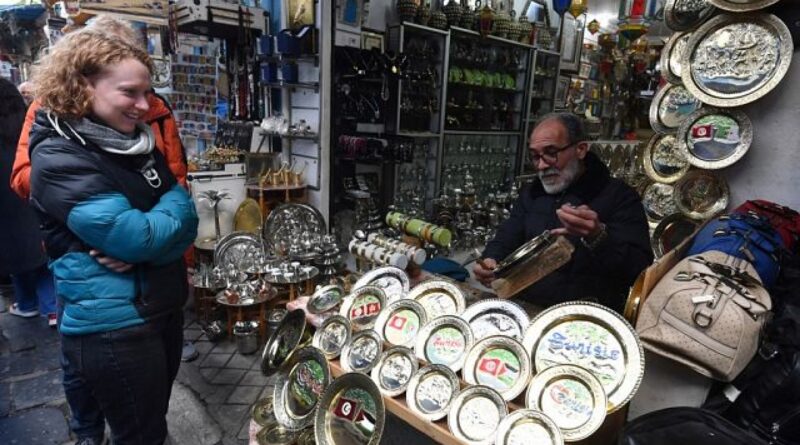Metal engraving, recognized by UNESCO in the Maghreb
A Tunisian craftsman presents a tourist with a copper plaque he is engraving in his store in the souks of the Tunis medina, December 7, 2023.
–
Copyright © africanews
FETHI BELAID/AFP or licensors
Tradition
The ancient techniques of metal engraving, such as Matis tracing, openwork, or setting, were very recently recognized as intangible heritage by UNESCO.
However, these methods are little valued in the Maghreb region, where artisans face challenges in preserving and passing on their expertise.
Tunisian artisan Mohamed Amine Htiouich is passing on his knowledge of this ancient art form to the next generation.
“I fear that this profession will disappear forever. Yes, I really do. I inherited this profession from my father, from my whole family. If this profession disappears, one day there won’t be any engravers left,” said Mohamed Amine Htiouich, craftsman engraver.
Throughout the Maghreb, metal engraving is passed down from father to son, using traditional methods. But to adapt to new demands and to ensure the continuity of this ancient art, the craftsman learned machine engraving.
“We’re here to teach them the basics of trade. How engraving and soldering work, and how to assemble and finish. Then they’re free to engrave whatever they want, creating an object that reflects our times and what today’s young people appreciate,” said Chiheb Eddine Ben Jaballah, teacher and president of the National Chamber of Craftsmen.
Despite gaining international recognition, local artisans feel that metal engraving is undervalued in their home countries and lacks government support.
Walid Sellami, a jewellery designer from Algiers, finds pride in the prestigious recognition but believes it won’t bring significant changes unless the art is recognized locally.
“I’d like people to recognize this profession, the engraving, the setting… There are so many trades in this profession. I’d like to see it more widely recognized in Algeria, Morocco and Libya. There should be production workshops. That would make me happier and prouder. But for me, it’s a title (UNESCO listing) like any other. It doesn’t change much in reality,” expressed Walid Sellami.
The candidacy of this craft adorning jewellery, kitchen utensils or decorative objects was supported by ten Arab countries including Tunisia, Algeria and Morocco.
Related articles
Most read



